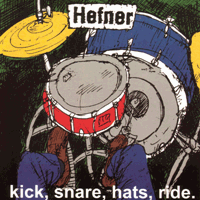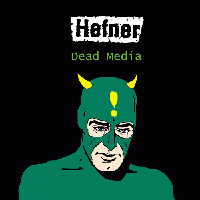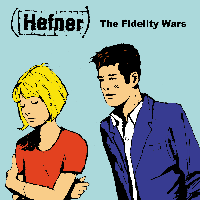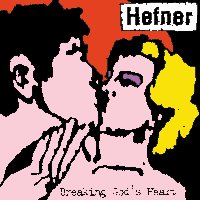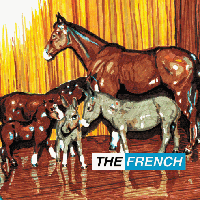
Originally released August 11th 2003
Following their last album with Hefner, Darren Hayman and John Morrison made an entirely electronic album, Local Information, under the name ‘The French’. Now considered by Darren to be his favourite album, the record was featured as a ‘Buried Treasure’ in the September 2009 issue of MOJO magazine.
Vive the French!
In October 2000, I found myself drinking champagne in an east London bar with Molly Ringwald. I’d had the usual schoolboy interest in the coltish American actress ever since The Breakfast Club; she was visiting town and a mutual friend suggested we meet. Molly wore fishnet stockings and her hair was short and brown. (Was it ever truly red?) We talked about a sitcom she was developing, and about the U.S. presidential race. When the bottle was empty she went off to have dinner at the Ivy with Channel 4 star Graham Norton; I got in a taxi, exhilarated but slightly glum, and went home. A copy of We Love the City by Hefner— a London-based trio somewhere between folk and punk — had just arrived from Amazon. I hit the play button and heard the first line of the first song: “This is London/ Not Antarctica/ So why don’t the tubes run all night?/ You are my girlfriend/ Not Molly Ringwald/ So why won’t you stay here tonight?”
After my freak-out subsided, I realized it was a perfect Hefner moment. Through five albums starting in the late ’90s, the band constantly blurred the lines between life and art — with songs about love-wrecked, angry misfits living in rented outer London bedsits — and produced some of the funniest, most tender independent music to come out of the U.K. in a decade. Hefner appears to have evaporated, but the creative force behind it, Darren Hayman, has formed the French, which this week releases its debut Local Information, a winning collection of story songs from the miserabilist and his electric keyboards.
“I don’t like to say we split up,” Hayman says of Hefner. “It’s just that four or five albums is enough, unless there’s something really new to do.” Hefner’s drummer and guitarist are pursuing solo projects, while Hayman and bassist John Morrison are the French. Why call a band the French? Hayman, who grew up in Essex, explains that due to the antipathy his countrymen have for their neighbors across the Channel, “it’s a kind of litmus test of my audience.”
His audience — somewhere between big cult and the bottom of the pop charts — will be relieved to discover that the essence of Hefner is still there: the realization that the stupid experiences we all have can be the building blocks of art. Hayman’s is the music of false starts and dead ends; like Woody Allen and Philip Roth, he turns unvarnished neurosis into art.
The French sounds much as Hefner did on their last album, Dead Media: sparse organ arrangements that almost qualify as melodies, with occasional blips and bleeps added. Hayman says he had to create a new band to accommodate his increasing push toward electronica: “I don’t think of eclectic as a good thing in a band, and to record the songs the way I want them to sound as a Hefner record would be misleading people.”
The biggest change is that Hayman — at least in his songs — has gone straight and domestic. Not that surprising: Hayman is now 32 and looking for property in Barcelona. In The Pines, a kind of love song between white separatists in the American South, the man who wrote the boozy anthem The Hymn for the Alcohol now proclaims: “I don’t do drink or take no drugs/ But Christ she’s hit the bottle/ Like there’s no tomorrow.” And while Hefner ballads usually chronicled a brief infatuation, many French songs are about something like commitment. In The Stars, the Moon, the Sun and the Clouds, the singer chastises his girlfriend’s scholarly squalor: “It’s all very well/ Learning poetry by heart/ But it doesn’t mean/ We have to live like poets.”
As with so much electronica, there’s a soulless quality to this record, not helped by Hayman’s insistence on recording with a drum machine. His DIY aesthetic has its own appeal, but without guitars to ground it, his plaintive voice risks floating off into nasal helium. But he can still make me laugh. The best track is Gabriel in the Airport, a wicked attack on the pretensions of Peter Gabriel: “And the British Airways girls they sigh/ Saying ‘There goes that Phil Collins guy.'”
Listening to the French is much like listening to the indie-rock god Stephen Malkmus’ solo work; it gives you a wistful yearning that his great band Pavement was still recording, but you’re grateful for anything you can still get. As for Molly, the last time I saw her was in the New York Post, pregnant. There’s a song in there somewhere.
Buy Local Information by The French on CD
Or buy the downloads from Bandcamp

